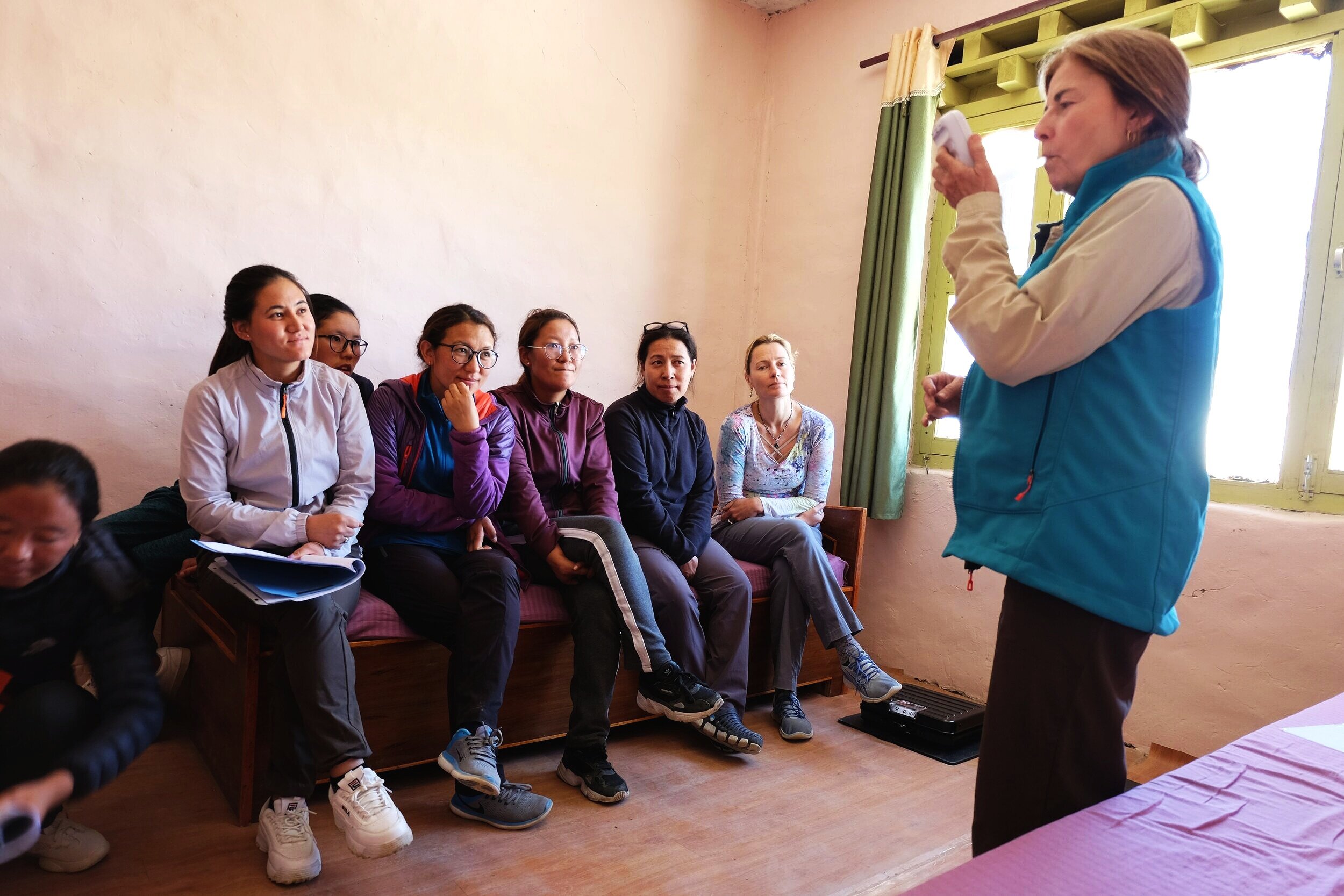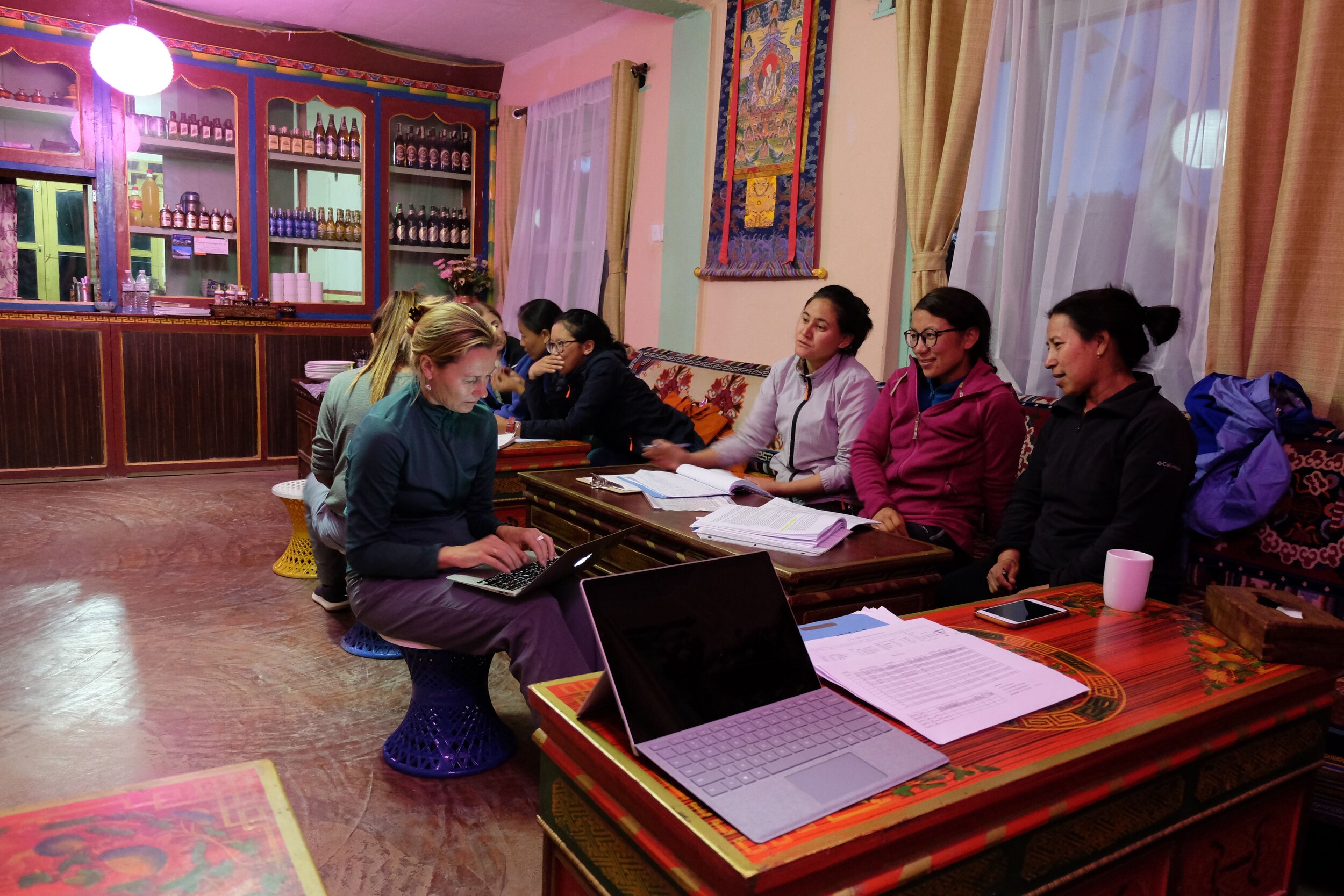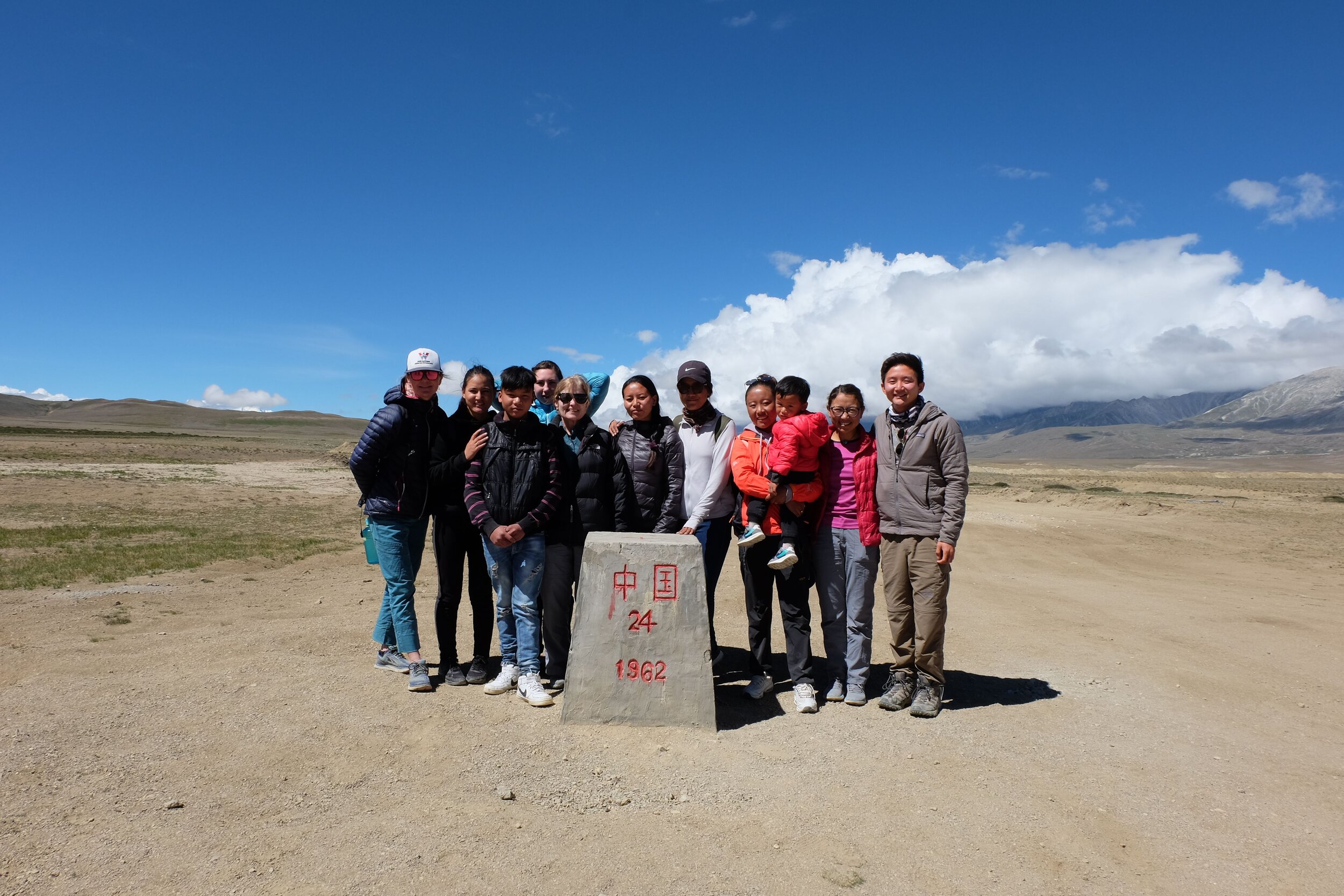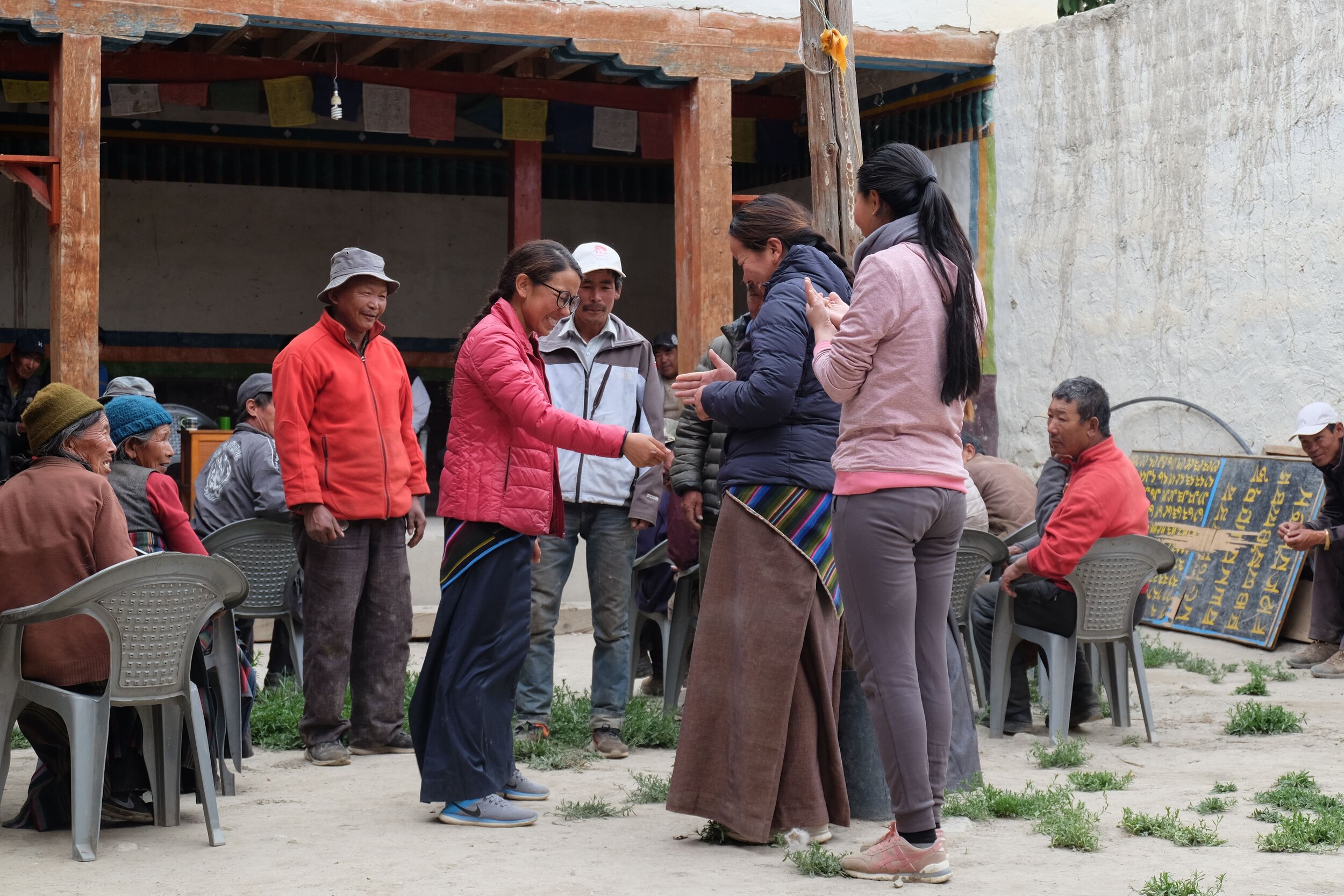higher altitudes and
hopes for health
wangmo’s story
“They say when you are pregnant, you are setting one foot in death’s door and one foot outside of it.”
Tsering Wangmo spoke matter-of-factly, as if remarking on the weather. It was an ominous platitude of sorts, reflecting the lingering wisdom of a tenured nurse. Someone who’d witnessed both the joys and tragedies of birth in equal number, over many years.
Except that Wangmo is 27, nowhere near a veteran in her field. Technically, she’s only worked in nursing for nine years. But to carry on the trend of speaking in platitudes, experience is oftentimes measured in mileage instead of years. And in every sense of that word, Wangmo is as seasoned as they come.
Miles removed from luxuries that most take for granted, Wangmo grew up in the village of Dho, part of Nepal’s greater Dolpo region. She estimates that the community, located approximately 4,200 meters above sea level, is the highest settlement area in the country--”above the treeline,” she specified, adding that “these areas are more remote than what we call the modern world.”
For those searching for a romanticized escape from just that, Wangmo’s words are a welcome invitation. While the grass may seem greener, though, the pastures in Dolpo are much less fecund than what wayward travelers may anticipate.
“From our local perspective, half of the year is wintertime; there will be snow,” she shared. “We grow only two crops--barley and potatoes--and fetching water will take 15-30 minutes. You carry on your back; we grew up doing those walks.”
Arguably, that amount of physical labor would overwhelm a school-aged child at any altitude. Compounded with Dolpo’s high elevation and extreme climate, it’s difficult to imagine that anyone unaccustomed to the harsh conditions--anyone not born, nurtured, and molded by the mountains--would be able to thrive, let alone survive.
And that’s assuming they never needed medical care. Should the need arise, “the nearest place for health or commodities is about three days’ minimum, two days’ walk,” Wangmo shared. “Ten hours a day walking, at a very high speed. Tourists take about four days.”
“Life is always between 4,000 and 5,000 meters,” she added. “There’s no one with chronic mountain sickness; we’ve never known that. We live in a close community where you know everyone, everyone’s cattle, everyone’s field.”
Everything, for everyone. It sounds simple and liberating on paper. But the challenges tied to Dho’s communal way of life belie its minimalism. From Wangmo’s point of view, persisting tensions around the community’s patriarchal structure and fragmented healthcare were reason enough for her to seek answers beyond Dho and Dolpo, in hopes that she could return and help shift her community in a more progressive direction--respecting tradition, while adopting ideas that characterized more modern societies. Setting one foot in a different door, and one outside of it.
“I was trained to work under a doctor and carry out orders in a hospital system.
But out in the communities, we were the doctors.”
It is a door with a deadbolt lock, only accessible with keys rarely handed over to the women in Dho. Equal pay isn’t a topic of conversation; the question is if women receive pay for their contributions at all. Or, if their contributions are even perceived as legitimate work in the first place. These layers, peeled back one by one, lay the Dho’s male-dominated culture out in the open.
“Women are perceived as the homemakers,” Wangmo said. “At the end of the day, they will marry. And ‘all’ they have to do is raise the kids and take care of the house.” Even though tending to the family unit’s fields is physical labor, mirroring the work that men do to prepare and harvest crops, for women in Dho, “it’s seen as ‘feeding the house,’” she noted.
Complete dependency on women to manage the home, consequently, has defined how often and far they are able to extricate themselves from its daily demands. According to Wangmo, it’s common for men to travel overnight for work. Meanwhile, “women would go near places where they could go back in one day,” tethered by engrained expectations.
Ironically, the only other role that shoulders responsibility upon women is one typically revered and respected by the rest of the world. Without any community clinics or access to western medicine, “accessibility [to healthcare] always depends on the senior women in the house who have knowledge, acquired from prior generations, and amchis [a colloquial term for ‘medical healer]” Wango recalled. Growing up, she recalled, “kids couldn’t get vaccinated. [They] died from measles or basic diseases like diarrhea; others out of luck, would survive.”
Call it luck, fate, or youthful vitality; the meaning behind the terms was on her side. As she quickly learned, though, the same could not be said for the rest of those in her inner circle. Wangmo recalled losing her mother around age eight and her father roughly seven years later, both from preventable causes.
“My mom was having liver pain for about three days. The cultural response was to keep it separate, not tell people. Finally, my grandmother couldn’t do anything more, so we called the amchi.” Looking back, she knows now that the amchi didn’t have any greater insight or training to offer, rendering the situation helpless. Her mother passed away shortly thereafter; the cause of death was never determined.
Similarly, her father died in 2008 for reasons that were also not properly diagnosed or addressed. By the time he made it down to Kathmandu, where more comprehensive medical and health services are available, it was too late. Getting from point A to point B was only half the battle--“the only place for checkups was three days’ walk; then, if they couldn’t speak the language, they needed a guide,” Wangmo explained.
None of it was a novel concept. But the death of her father marked the birth of an idea, one that would guide the rest of her life. “I wanted to do something and help,” she said.
Although her father was no longer by her side, the choices that preceded his death gave life to Wangmo’s future. A decade prior, when a French NGO called Action Dolpo built a school in the community, Wangmo was one of only a few girls selected to attend--an opportunity made possible by her father.
“My father used to place education highly...I was very lucky. He said his kids should go to school and learn more, and be treated equally. So my brother went to school, and then he wanted me to go,” Wangmo remembered. “There was resistance from my grandmother. I was the only girl child in my family, so she wanted me to help at home.” Had he closed the door on Wangmo’s education and deferred to his mother’s wishes, Wangmo knows that her path would have been wholly different.
Instead, her path directed her down to Kathmandu in 2001, where Action Dolpo set up students after grade 5 for middle- and high school-level education. Similar to her father’s predicament seven years later, the journey from Dho to Kathmandu was its own challenge.
“There was a civil war in Nepal at the time, so we had to take another road and go over four high passes,” she recalled. “It was November and took us over seven days to go over the whole pass. The water was freezing and there were no hotels, so we were sleeping in tents.”
The years that followed were punctuated with challenges of their own, not counting the loss of her father. The distance separated Wangmo from her family for months, even years at a time, and after graduating from Action Dolpo’s program and enrolling in nursing school, she faced discrimination in Nepali communities where she was assigned to work.
“My friends said I have an accent when I speak Nepali, and sometimes it was very uncomfortable. Home visits were harder for me--people were pointing and saying that I am different, the way I speak is different, and my name is very different,” Wangmo said.
But while the roots of discrimination are differences, mortality is universal. And the pursuit of health, Wangmo learned, proved to supersede prejudices.
“I was trained to work under a doctor and carry out orders in a hospital system. But out in the communities, we were the doctors,” she said. “There were no labs. We only had very basic medications and training. But for the people [in the communities], they assumed we knew everything.”
With those assumptions came trust, even where Wangmo believed it was unfounded. And from that trust stemmed the emotional responsibility that weighs heavily on many healthcare professionals--the struggle to balance objectivity, science, and medicine with interpersonal connection, compassion, and genuine empathy.
“Working in my communities...taught me more than my nursing studies,” she said. But the most formidable test of her abilities didn’t cross her path until 2011, shortly after Action Dolpo hired Wangmo--then with a few years of real-world experience under her belt--to support their work as a healthcare provider, rather than as a pupil.
The concern was minor, at first. A late-night call from an anxious man, worried about his wife who was due to give birth. Nothing had happened, but Wangmo prepared her birthing kit anyway. Razor, thread, gloves, saline. “Just in case I needed to induce her,” she recalled. She made her way to the expecting couple’s home.
As she’d been taught, Wangmo went through the motions of checking the mother. At first, her palpations found nothing that raised alarm. Then, she realized that the baby girl was transverse, turned sideways in the womb. Inducing wasn’t the problem now--if anything, she’d need to stave the onset of labor as long as possible.
“I was literally praying that she wouldn’t go into labor,” she said.
Knowing that she was the only dedicated health professional for miles, and that the closest medical center was only accessible by three days’ walk or via a chartered helicopter, amplified the severity of the situation. The arrival of the local amchi, who suggested that they “shake her [the mother] upside down,” only made things worse. Shortly thereafter, the intense labor pains started.
“Because it was transverse, we wanted something to come out,” Wangmo shared. But as the mother pushed, “it was not a head [that came out], but a foot.” They continued to deliver the child until the lower half of its body was exposed, before an abrupt halt jolted the room. A collective, pregnant pause.
“Then, the baby turned blue.”
Wangmo reached in and felt the baby, the upper part of her straddling the only world she’d known in her singular months of life. One foot in death’s door, the other outside of it. Soon to be both feet in death’s door, if Wangmo didn’t act fast.
“I saw that the cord was around her neck,” she continued. Working quickly, she managed to deliver the child, “but by that time she was not breathing and blue, no cry. Flat.” The amchi insisted that the baby had died. Still, Wangmo refused to throw up her hands. Her inner monologue screamed at her, “I don’t want to give up... it’s her [the mother’s] first child.” It was also Wangmo’s first time delivering one.
“I did everything, like back rubbing, but I needed suction,” she said. In this case, necessity was the mother of invention, and improvisation. “I said, ‘let’s cut the IV line and use my mouth as a suction.’ So I put the line in her [the baby’s] nose and used my mouth as a suction.” The baby’s faint cries that ruptured the tense silence were their own reward.
Wangmo still feels the ripples from that night. Today, she is still in contact with the family; the baby she delivered is now a young girl. One who crossed the right threshold, thanks to Wangmo’s efforts and tenacity.
It’s an opportunity, an option, that Wangmo wants to give others as well, even if she can not have it for herself. “I told this story to my granny later; she started crying so hard,” she said. “She said, ‘If there was someone like you in your mother’s time, she would have been saved.’”
Someone, for everyone. Over the next five years, Wangmo used her learned and earned skills to be just that within the communities she served--the doctor, the nurse, the midwife, the public health expert; an advocate, a confidante, an educator.
“I fell in love with working in rural areas. You see the impact of your work, even if it’s very small. You see the relief in people’s faces, even if you give them Tylenol,” she commented. She continued to hone her skills and knowledge in birth training, contraception, vaccinations, and more, collecting experiences and acumen like valuable coins.
The only pause in her real-world training occurred when she pursued a bachelor’s degree in nursing; upon graduation, she jumped into work with the Upaya Zen Center’s Nomads Clinic. Alongside Nepali doctors and nurses, and volunteer doctors from western countries, the group travels to different villages of the country and hosts clinics in one-month stints.
“The basic idea is to provide healthcare where no one goes--but the care should be medical and spiritual,” Wangmo explained. Supporters of Nomads Clinic believe that eastern and western medicine can, and should, be practiced in tandem and in harmony; “it’s a very beautiful interaction between the doctor and the people, because the doctor sees them,” she insisted, adding that the equality between east and west makes it easier to introduce more modern tactics—the former is perceived just as valuable to the latter, which encourages more integrative, open-minded, and collaborative approaches to patient care.
The unconventional, yet effective approach made it possible for her to introduce and teach local women and girls the fundamentals of feminine hygiene, after she noticed that the subject was misunderstood and stigmatized in the communities she served.
“I started a menstrual health program and the women loved that...the dialogue,” she noted. That particular initiative earned her recognition from a visiting physician in 2018, whose mother used to be a nurse.
“[The award was] for women working in the mountains,” Wangmo said. “His plan is to pass it on every year...I have the responsibility to find someone.” She paused. “In a way, I think, it’s motivation. I feel like I have to work more and make myself more deserving.”
One would argue that she’s already proven her competence, and then some. Then again, the subject at hand is a young woman who speaks seven languages, inclusive of Hindi and French. Who supported a research trip to Nepal in 2019 under Cynthia Beall as a nurse, translator, research assistant, and study participant advisor. And who applied for programs in the United States to earn a Masters degree in Global Health, all while working as a co-director of Nomads Clinic.
While Wangmo’s certainly earned her stripes, she isn’t the type to idle, even at the top of the peak. Her short-term goals, she shared, are to obtain a Masters degree in the States before returning to Dolpo to set up a clinic, one “with at least basic services like labs for routine tests, a well-trained doctor supported by an equally well-trained and motivated medical team, and enough medicines [to support] at least the best of the very basic services.” Short-term or long-term, large or small, her driving motivation is the same.
“I wish to see my people get health services, to not struggle for every tablet of medicine. I hope to see my community become more aware of their rights in health services--or any other fundamental rights--and voice for them,” she said. “Having better, comfortable, and longer lives, [with] their integrity, culture, and authenticity intact.”
Even in a marginalized community like Dolpo, where the air is thin and accessibility to viable healthcare is just as slim, she believes in its potential and her own.
“We have so much strength and capabilities, we will be surprised by ourselves,” she claims. “In my life, I always found that once I believe in my plans and goals, and have clarity of what I want, the next step is just taking a step.” A step forward, all in, through the doors she’s opened for herself and those not far behind her.








